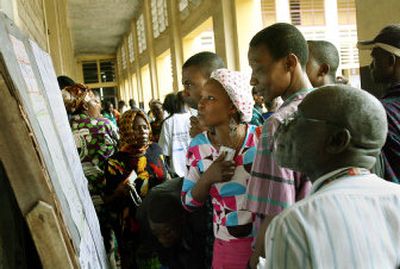Voting mostly peaceful as Congo awaits results

KINSHASA, Congo – Hoping for a fresh start after decades of conflict and misrule, voters across this massive Central African nation went to the polls Sunday in a presidential election watched over by thousands of international troops.
The runoff between incumbent Joseph Kabila and Vice President Jean-Pierre Bemba comes after Kabila fell 5 percent shy of a majority in July’s first round of voting, the first democratic presidential election in Congo in more than 40 years. Results are expected by Nov. 10.
Sunday’s vote was peaceful in most of the country, but tension surrounds the tallying of votes, which began when the polls closed.
In August, as first-round results were announced, deadly clashes erupted in the capital, Kinshasa, between the two candidates’ personal armies.
On Sunday, more than 2,000 U.N. troops and 1,700 European Union soldiers kept watch over Kinshasa from behind heavily fortified positions throughout the city.
Underscoring the anxiety elsewhere in the country, two people were killed in Equateur province when police opened fire on Bemba supporters who were rioting in protest of alleged ballot-stuffing in favor of Kabila. The Bemba supporters destroyed the polling station, U.N. officials said.
But international observers pronounced the election an overall success. The question now is whether the loser and his supporters will accept defeat.
“Our nation has a crisis of political legitimacy,” said Sony Kafuta Rockman, an influential evangelist and Kabila ally. “The loser must accept the verdict of the people.”
Racked by a civil war that started in 1997 and eventually involved six neighboring countries and caused the deaths of some 4 million people, Congo, despite huge natural riches, sits near the bottom of nearly every world ranking of health and economic development. Life expectancy has plummeted to only 45 years.
Staging these elections has been an incredibly complex effort, one that has cost the international community more than $500 million. But William Lacy Swing, the top U.N. official in Congo, said over the weekend that the election could stabilize a volatile region and called the voting Africa’s most important since 1994 elections in South Africa ended apartheid.
On Sunday, heavy rain fell on Kinshasa, likely suppressing voter turnout in a city that went robustly for Bemba in the first round. Some polling stations opened more than two hours late, but officials said they would allow voting to go on past the deadline.
As rutted streets turned to rivers and electricity flickered on and off, voters trickled in, clad in flimsy ponchos or toting huge patio umbrellas. Once inside dark polling places, many voters struggled with the instructions – choosing from more than one candidate still is a relatively new concept in Congo.
“It was easier to vote the second time,” said Francesca Ngundu, a 65-year-old widow.